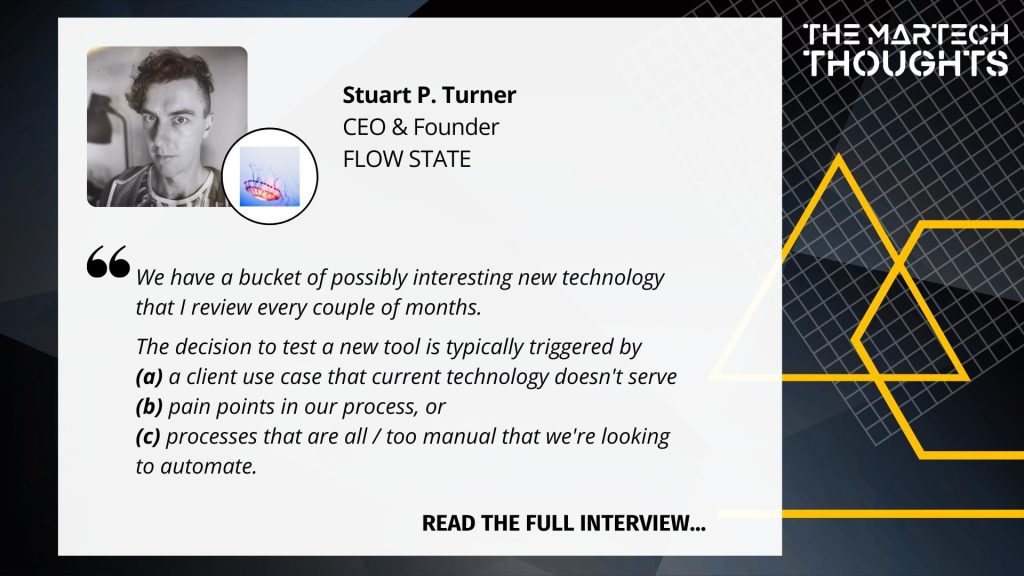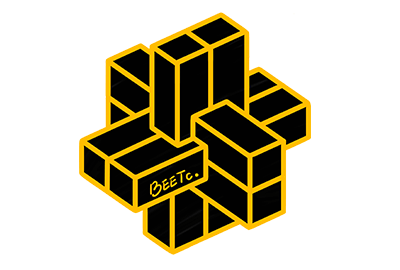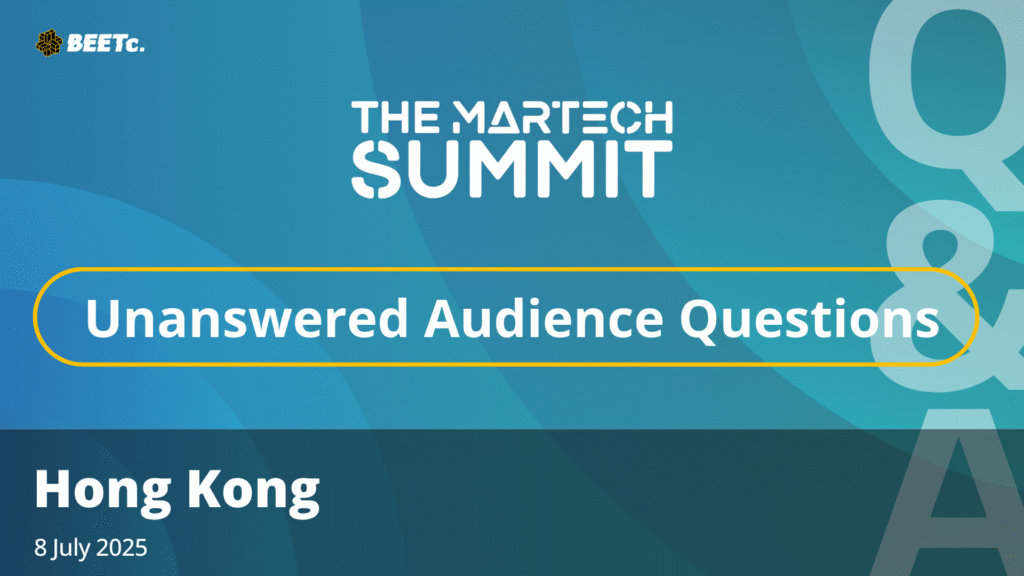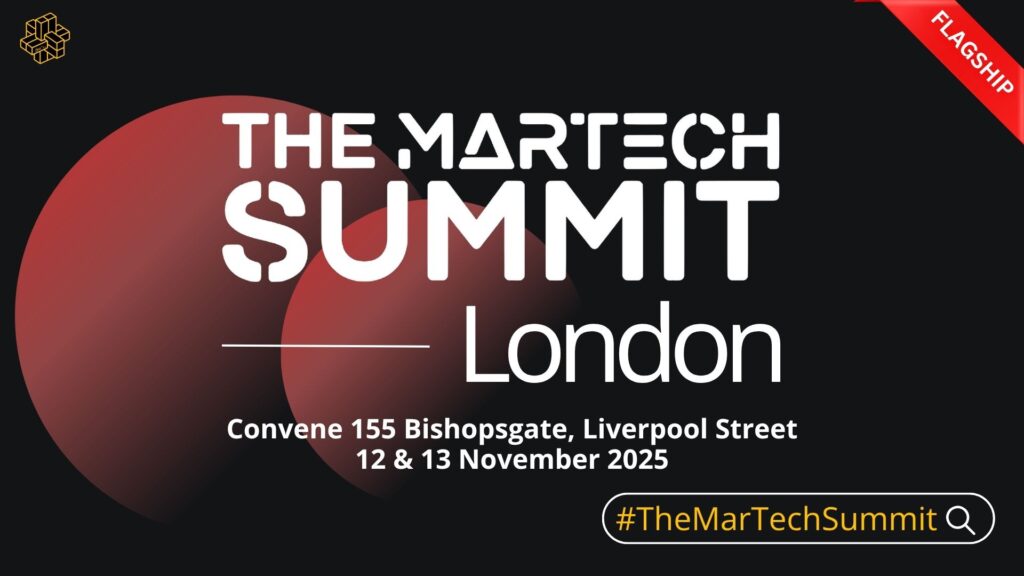
Stuart P. Turner, CEO & Founder of FLOW STATE, shares his insights on Marketing Strategy and Emerging Technology, as part of the MarTech Thoughts series.
What are the top priorities for a MarTech Stack Optimisation Strategy to achieve?
Improve marketing efficiency; Drive pipeline growth or acceleration; Improve personalised customer experience; And improve data management & security
What would your company use AI the most for?
We personalised content around complex B2B customer buying journeys, so to get the scale required for AI to be useful we would need to map out the consistent parts of the buying groups, and journeys and then see how we could personalise content against that framework.
What is the greatest roadblock in trialling new innovations in Marketing Technologies?
No compelling event to change the status quo
Marketing Strategy
What are some of the significant changes to your customer outreach and retention strategies? And how has it impacted the growth plan for upcoming years?
I’m currently deep in the ABM (Account Based Marketing) space with FLOW STATE. I’ve worked in digital and media for a long time, so working in a much more targeted fashion has been a refreshing change.
The focus only on current customers we have and specific customers that we want create a focus in execution that I find is often lacking in mass marketing. It has helped us to create very specific, effective and relevant ways to reach and engage our customers.
At your organisation, what tasks in marketing are good to automate and what tasks still need a human touch?
In my view, everything is a candidate for automation! By the same token, everything needs the human touch – it’s more a question of when and where it is applied.
For example, we automate a lot of tactical basics such as post-publishing for our program members. However, we still need humans to manage the schedules, respond to changes, and assess whether we are improving or not…
Wherever automated solutions can (a) reduce menial legwork for our team and (b) reduce the chance of human error, we automate.
This makes our solution more robust and lets us concentrate on the high-impact work, not the button-pushing.
How do you balance experimenting with new technologies vs investing in current technologies that you already utilise?
We try to use as few tools as possible – as you know, there is an ocean of SaaS solutions, often multiple tools that do some flavour of the same job. It’s easy to waste hours investigating solutions that don’t add material value but look different / have a nicer UI / someone likes more than the one we have.
We have a bucket of possibly interesting new technology that I review every couple of months. The decision to test a new tool is typically triggered by (a) a client use case that current technology doesn’t serve, (b) pain points in our process or (c) processes that are all / too manual that we’re looking to automate.
I’m a big fan of building bespoke solutions as well so often we’ll investigate developing our own solution alongside options available in the market to reduce reliance on third parties.
With more consumers being conscious of their data being shared, how do you overcome the growing concern?
We focus very heavily on the owned/earned space (or organic if you prefer – pick your favourite buzzword!) so our data gathering is minimal compared to those focusing more heavily on advertising.
A lot of our strategy is pull-focused; drawing people in and letting them share their data when they are reading and active opt-in (rather than assumed opt-in). We work across the globe, so we have to be sensitive to various different levels of legislation and sensitivity around data – it’s an interesting space.
Ultimately transparency, managing expectations and building trust are the building blocks of our approach to consumers.
Currently, what are you primarily looking for in your digital marketing efforts? Awareness or engagement? Why?
We look for both for one reason; branding.
Awareness has been bastardised and devalued by the digital industry over the years, but brand strategy and the reach of your brand are still incredibly important – especially in light of some of the other things I’ve mentioned elsewhere!
When planning a marketing budget, what are the top 3 concerns one should watch out for post-pandemic?
The key concerns for me are very much tied to the “new world” of hybrid work. So I think:
1. In some countries, there is a big assumption that events will return like in the old days before covid – I’m not convinced that everyone has the appetite for this, which will mean a big chunk of your marketing money may need to go elsewhere.
2. Walled gardens – the walls are getting higher. I’ve seen a lot of talk about what we used to call native content (re-branded “zero-click content”). It’s very easy to spend a lot of money on search and social media (as well as building your content) only for the media vendors to undermine that spend because they don’t want their users clicking off their own properties.
3. The environmental impact of cloud services. The silence on this subject is deafening, but I think the costs of a lot of cloud-based businesses are going to start creeping up as they start to consider how to offset energy usage and be seen to be green. It won’t only hit the budget but also the ESG policies of many brands. Think of it like provenance in the food industry – the MarTech supply chain is shady as they come, and it might be time to start shining a light on our own before someone else does.
Emerging Technologies
What will be the next evolution in marketing technology that we can expect in the coming years?
Evolution in marketing technology for me is very heavily tied to evolution in consumer electronics.
I think the next big step is going to be moving into AR (augmented reality). It’s 50% exciting, and 50% depressing, but the 5th Element/Blade Runner style real-world augmented ad formats are one of the things I’m most interested in.
There are already some great examples of 3D screens, it’s only a matter of time before the technology to deliver holograms, reactive/interactive imagery and all the rest becomes cheap and widely available.
Unfortunately the crypto industry and the current Ukraine situation have caused a huge block on some key components so this may be a bit further away than I originally thought…
What is the best use of technology you have seen during this time of crisis?
The classics that bring people together to be honest.
In unsettled times it’s incredible that we can see what’s happening almost anywhere with video calling, the ability to communicate at scale about important events on (uncensored) social media, and the fundraising efforts at an individual, group or org level through dedicated websites with purpose are really awesome.
How could a marketer start utilising the Metaverse?
Personally, I wouldn’t touch it.
There is a clash coming between the old guard already in it (i.e. gamers and old-school nerds with a lot of money to spend on PCs) and corporate suit wearers that simply want to create commercial value from everything.
The consumer technology isn’t there, the imagination around what to do outside of specific established niches (i..e games) isn’t there, and to be perfectly honest I don’t think people are crying out for it either.
We’ve all been trapped in our houses/local areas for two years, we want more human contact, not less.
With the advancement of AR & VR, how do you see these being utilised in Digital Storytelling?
I’m way more excited about AR than VR, possibly because of my love of sci-fi… I think the potential to tell a story with the massive potential for visual creativity inherent in AR, that is firmly grounded in the real world is super exciting and I can’t wait to see what people come up with.
In terms of how I see it being utilised, as I mentioned earlier I think we’ll see AR ads in the near future and little stories in our everyday environment.
I would love to see AR in the arts – imagine how the technology could be used in a play, a gig or a musical to add an extra element of immersion to a performance. The possibilities here are endless.
I see AR as a huge opportunity to enrich and complement our experience of the world around us.
How do you foresee the role of gamification across industries?
Speaking from my current ABM / B2B focus; I actually think gamification is quite underutilised in a lot of brands.
At its basic level, it can be a great motivator, however I also feel it can be quite divisive unless everyone opts in themselves. Feeling forced into a competition is not to everyone’s taste and can have the opposite effect of actually alienating people from their role rather than motivating them.
Done well, I think it is a compelling way to bring people together, be they customers or employees, by setting personal context, encouraging self-led development and just making things a bit more interesting.
Done badly, it’s just another lame duck sadly floating around the pond awaiting a quiet retirement.
Follow Stuart on LinkedIn: https://www.linkedin.com/in/stuartpturner/
There is a second part of Stuart’s interview coming soon!
In the next post, he will share his insights about MarTech Tools, Customer Experience and ABM!
See more content here: https://themartechsummit.com/content-library/













